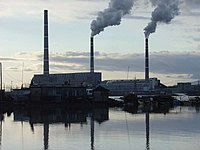
Photo from wikipedia
Abstract Grandfathering and benchmarking are two typical free carbon permits allocation methods used in the carbon cap-and-trade mechanism. These emission regulations would generate carbon cost and hence make the firm's… Click to show full abstract
Abstract Grandfathering and benchmarking are two typical free carbon permits allocation methods used in the carbon cap-and-trade mechanism. These emission regulations would generate carbon cost and hence make the firm's manufacturing and remanufacturing production decisions more complex. In this paper, we developed two models to contrastively evaluate the effectiveness of grandfathering and benchmarking methods on motivating the monopolist manufacturer to adopt low carbon remanufacturing practice in two periods. In the first period, the manufacturer produces completely new products without restrictions of carbon emission, while in the second period, the manufacturer can use collected returns derived from the first period to produce remanufactured products with carbon emission constrained by grandfathering or benchmarking regulation. We further analyzed the impact of carbon price, carbon emission saving per remanufactured product, and technology improvement on the production decisions. Our results indicate that the benchmarking method can more effectively motivate the manufacturer to adopt the low carbon remanufacturing production than the grandfathering method. We also find that the carbon price and carbon emission saving per remanufactured product would also affect the manufacturer's remanufacturing production decision.
Journal Title: Journal of Cleaner Production
Year Published: 2017
Link to full text (if available)
Share on Social Media: Sign Up to like & get
recommendations!